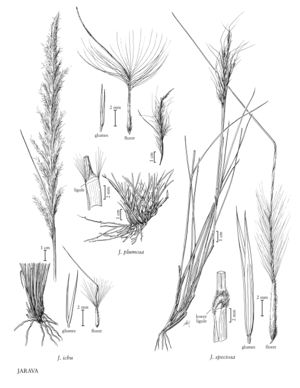Jarava speciosa
Plants tightly cespitose, not rhizomatous. Culms 30-60 cm, bases orange-brown; nodes 3-6; basal branching intravaginal. Sheaths mostly glabrous, throats densely ciliate, basal sheaths reddish brown, flat and ribbonlike with age; ligules varying within a plant, lower ligules 0.3-1 mm, densely hairy and ciliate, hairs 0.2-1 mm, often longer than the basal membrane, upper ligules to 2.5 mm, hyaline to scarious, glabrous or hairy, usually less hairy than the lower ligules, sometimes ciliate; blades 10-30 cm long, 0.5-2 mm wide when flat, usually rolled, to 1 mm in diameter, abaxial surfaces glabrous, smooth, adaxial surfaces pilose. Panicles 10-15 cm, dense, frequently partially included in the upper leaf sheaths at maturity; branches ascending. Spikelets 16-24 mm. Glumes linear-lanceolate, glabrous, tapering from below midlength to the narrowly acute apices; lower glumes 16-24 mm, 1-veined; upper glumes 13-19 mm, 3-5-veined; florets (6)8-10 mm; calluses 0.8-1.6(3) mm, sharp; lemmas densely and evenly hairy, hairs about 0.5 mm, without a pappus; awns 35-45(80) mm, once-geniculate, first segment pilose, hairs 3-8 mm, terminal segment glabrous, smooth; paleas 3.2-5.1 mm, 2/5 – 2/3 (4/5) the length of the lemmas, usually hairy, hairs about 0.5 mm. 2n = 66, 68, about 74.
Discussion
Jarava speciosa grows on rocky slopes in canyons of arid and semiarid regions of the southwestern United States and northern Mexico, and in Chile and northern to central Argentina. Several varieties are recognized in South America. It is not clear to which of these varieties, if any, the North American plants belong.
The reddish brown leaf bases, differing lower and upper ligules, and the pilose, once-geniculate awns make Jarava speciosa an easy species to recognize in North America. It is also an attractive species, well worth cultivating. It prefers open areas with well-drained soils. The growth of young shoots and flowering is stimulated by fire.
Selected References
None.
